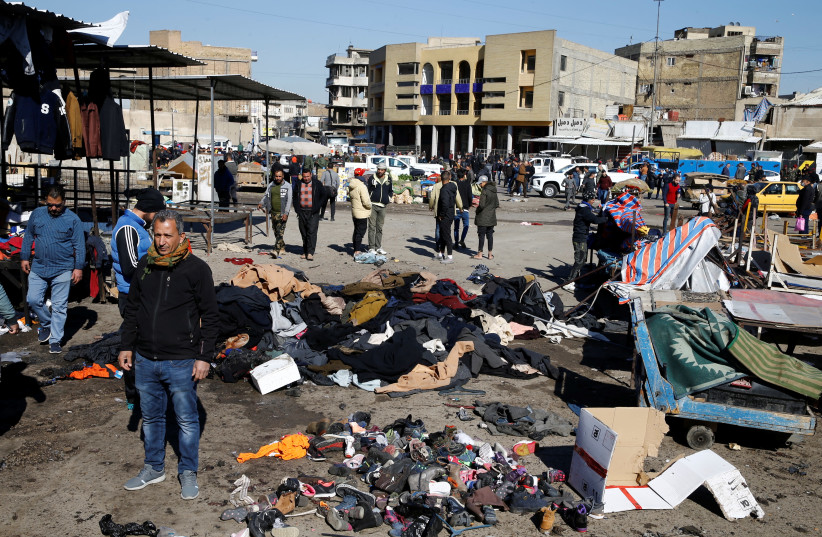Baghdad bombing could be the Biden admin's first challenge
The bombing was only four kilometers from the US embassy compound and occurred in an area where there have been protests over the last year and a half.
 The site of a twin suicide bombing attack in a central market is seen in Baghdad (photo credit: REUTERS)
The site of a twin suicide bombing attack in a central market is seen in Baghdad (photo credit: REUTERS)

A twin suicide bombing in Baghdad’s Tayaran square, packed with people shopping, left two dozen dead on Thursday afternoon, in the most deadly attack in more than 18 months, local reports said, recalling past years when suicide bombings like this were routine in Iraq. Islamic State perpetrated many attacks and while it is not known if this was an ISIS attack, it has its hallmarks.
The bombing, four kilometers from the US embassy compound, occurred in an area which has witnessed several mass protests over the last year and a half. In the fall of 2019 protesters often besieged security forces on Al Jumhuriya bridge, not far from the market where the bombings took place.
Online video appeared to capture the second of the two reported explosions in which up to 100 were reported wounded, near the “Bab al-Sharqi” area of central Baghdad.
There have been increasing threats and low-level attacks on convoys that supply the US in Iraq. Last year dozens of attacks with 107mm rockets were fired at the US embassy compound and at US forces in Iraq. The US has drawn down most of its troops, leaving only several thousand personnel, many of whom have been relocated to the autonomous Kurdistan region which is more sympathetic to the US.
In other areas of Iraq the pro-Iranian militias of the Popular Mobilization Units run checkpoints and have threatened the US. These groups include the Badr Organization, Kataib Hezbollah, Asaib Ahl al-Haq and Harakat Hezbollah al Nujaba. The day before the attack in Baghdad there were reports of an attack on a convoy carrying equipment to the US-led anti-ISIS Coalition.
The attacks carried out by pro-Iranian groups are often precise and use 107mm rockets. ISIS-style attacks use suicide bombers to kill civilians. Pro-Iranian groups are often more tactical and strategic in their killing, targeting foreigners or journalists or translators, but not randomly blowing up shoppers.
A source told Al-Ain Al-Akhbariya that “a suicide bomber wearing an explosive belt blew himself up at Tayaran Square in the Bab Al-Sharqi area, followed by the detonation of another suicide bomber meters away from the place of the first explosion.” It appears the use of two bombers was to draw in people after the first explosion and then target the onlookers. This is also a typical tactic of ISIS-style attacks.
The suicide bombing occurred in the same place, which is often crowded with pedestrians in Tayaran Square, killing 31 people 3 years ago, Al-Ain said. The attack could present the Biden administration with one of its first foreign crises. The US left Iraq in 2011 but then returned in 2014 at the invitation of the Iraqi government to help lead a coalition against ISIS. The US has trained and mentored around 250,000 Iraqi troops with the support of dozens of members of the coalition. These include European countries. The US is also supporting training and equipping of the Kurdish Peshmerga in northern Iraq. When US-Iran tensions rose in 2019 and early 2020, and the US killed Iranian IRGC head Qasem Soleimani in Baghdad, many foreign advisers left. The Covid-19 virus has also reduced training.
The bombing provides US President Joe Biden with an early opportunity to show US support for Iraq. Biden has said that the US is “back” and the world can expect the US to care again about foreign policy and work multilaterally to solve problems. Iraq is a very complex problem. The pro-Iranian groups want the US to leave. Groups like Ashab Kahf and others linked to Iran are threatening people who work as interpreters, for instance, according to a tweet by the BBC’s Nafiseh Kohnavard.
Iraqi President Barham Salih said that “two terrorist explosions against the safe citizens of Baghdad, at this time, confirms the endeavor of dark groups to target the great national needs.” He said that the people of Iraq aspire to a peaceful future, we stand firmly against these rogue attempts to destabilize our country. We ask God to provide mercy to the victims and to heal the wounded.”
At the same time the US-led coalition continues to highlight successes in Iraq. It says that over the past year, 360,696 square meters of land have been cleared of mines and explosives. “Some 7,300 explosives parts and devices, and 1,172 mines have been extracted by our agency,” said Jabar Mustafa, head of the Kurdistan Region’s Mine Action Agency (IKMAA). The old Erbil-Kirkuk road, connecting the town of Qushtapa with two nearby refugee camps, was re-opened on January 8.
Coalition Spokesman Col. Wayne Marotto said that it sends “our condolences to those affected by the attack in Baghdad today. This is yet another instance of terrorists killing fellow Iraqis & harms those who seek peace.” The recently appointed Middle East coordinator for policy under Biden, Brett McGurk, was a former envoy for the US-led Coalition against ISIS. An expert on Iraq, he will take a keen interest in addressing the issues in the wake of the bombing.
There are other tensions as well. On January 18 pro-Iranian groups claimed a mysterious airstrike targeted their weapons warehouse at Jurf al-Sakhar, 40 miles outside of Baghdad. In fact it appears that the incident was also an ISIS attack.


No comments:
Post a Comment